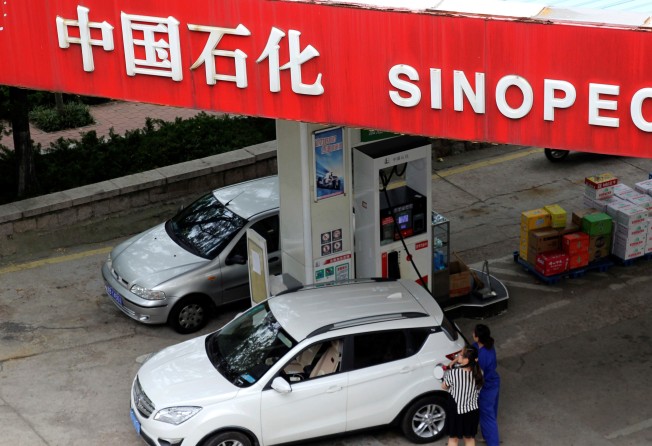How about fresh veggies and meat when you get gas? Sinopec offers new touch-free service amid coronavirus fears
- Convenience stores at gas stations in Beijing, Hangzhou, and Guangxi province delivering app-ordered groceries to car trunks
- ‘If this practise is welcomed by customers, we may in the future continue it,’ Sinopec spokesman says

Sinopec Corp. is offering customers terrified of catching the coronavirus a novel way to fuel up on gas and food – with no touching involved.
Customers place orders through an app. Workers at some of its Easy Joy Convenience Stores will then put fresh vegetables and meat directly into the customers’ boots as they get gas.
The experiment has just started in Beijing and Hangzhou as well as in Guangxi province. But some of its 27,000 convenience stores in more than 30,000 gas stations in China may try out the idea later.
“If this practise is welcomed by customers, we may in the future continue it,” said Sinopec spokesman Lv Dapeng. “If not, it’s only to meet demand in a special time.”
Subsidiaries will decide on the food delivery option, said Sinopec, the state-owned giant that accounted for about 55 per cent of China's oil product sales volume in 2018.
The vegetables come in a package that weighs around seven kilograms and includes about 10 kinds of vegetables and 10 eggs. That would provide enough food for a family of three people for about three days, according to Sinopec’s Exhibition Road station in Beijing.
The refiner’s Guangxi province branch is collaborating with a local company to sell chicken, while at least three gas stations in Hangzhou city are selling vegetables that are provided by Alibaba Group-owned Fresh Hema, a retailer that combines online delivery services and bricks-and-mortar shops. (Alibaba owns the South China Morning Post.)
Adding the option for delivery of vegetables and meat is smart, said one analyst.
“The business diversification is likely to prove beneficial as the industry battles with an oversupply of oil products in China, especially after the government started to grant crude oil import rights to independent refineries since mid-2015,” said Danny Huang, director at S&P Global Ratings. “Sinopec can leverage on its extensive marketing and distribution network, currently the country’s largest with over 30,000 gas stations, or 30 per cent of China's total, most of which are well-positioned.”
Sinopec’s Easy Joy Convenience Store ranked first in Top 100 Convenience Stores in China, according to the China Chain Store & Franchise Association. In the report, based on assessment in 2018, Easy Joy owned 27,259 stores nationwide, which was 38.4 per cent more than the 19,700 convenient stores run by China National Petroleum Corporation, the second-largest state refiner.
Sinopec’s step comes as online retailers are overwhelmed by orders for food deliveries amid the coronavirus outbreak. Tens of millions of citizens are still in lockdown, after China took the unprecedented step of quarantining cities in Hubei province and some elsewhere to combat the spread of the pneumonia-like illness.
Lv said Sinopec’s main motive was to fulfil its social responsibility as a major state-owned enterprise.
“This [business expansion into retailing] is also seen in other gas stations in the region with regards to diversifying their income stream in addition to fuel revenue, in an attempt to be a one-stop service provider for customers,” said Michelle Leong, a director at Fitch Ratings. “At this juncture, non-fuel revenue is not expected to be a core income generator.”